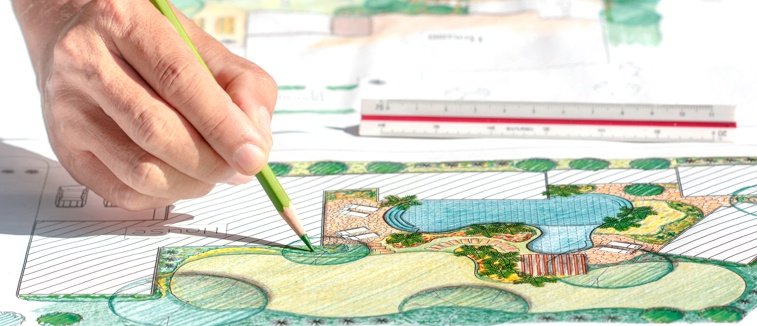What Does a Landscape Designer Do?
Landscape design in the USA is not just the art of creating harmonious and functional open spaces, but also a promising field that opens up wide opportunities for professional growth and financial success. However, to achieve career heights, talent and knowledge alone are not enough – an important step is to obtain an appropriate license, for example, a C27 contractors license, which allows you to become a professional contractor in the field of landscape design. In this article, we will consider the features of the landscape design field, and the skills required for work and tell you how to get a license.
What Does a Landscape Designer Do?
A landscape designer is a specialist who creates aesthetically attractive and at the same time functional spaces that blend harmoniously with the surrounding environment. The scope of this specialist’s activities is not limited to land improvement and the design of city flower beds. A landscape designer is a thoughtful engineer, architect, botanist, and soil scientist, a person with good taste, who knows the basics of composition, understands color, and understands which materials are appropriate in which climate and how to transform an area with the help of competent lighting.
A landscape design specialist implements projects that vary in both scale and purpose. This can be a new look for a city park or square, landscaping of an entire micro district, or a cozy old courtyard, garden, or garden plot.
The implementation of each such project includes several stages:
- Meeting with clients to discuss their needs, preferences, and project budget.
- Site analysis, assessment of environmental conditions, soil quality, drainage, existing structures, plants, etc. on the site.
- Project development: preparation of detailed plans, drawings with descriptions of elements, their visualization, and their presentation to the customer.
- Selection of plants, materials, and lighting.
- Design of irrigation, sewerage, and storm drain systems.
- Drawing up an estimate and coordinating details with customers.
- Monitoring the implementation of the project, the quality of work, and management of contractors.
- Professional advice and recommendations to customers on the care of the renovated territory.
A designer can create a new space on a turnkey basis – from an idea, or concept to their full implementation. Or he can provide clients with individual services – for example, go to the site and consult on what and how best to do, or develop a project for an artificial reservoir for a garden plot. In each case, the specialist will have his own range of responsibilities.
Where Do Landscape Designers Work?
Competent specialists are in demand in many areas, so landscape designers have different employment options:
- landscape design firms;
- construction companies and architectural firms;
- garden centers and plant nurseries;
- departments of urban economy and ecology;
- municipal landscaping services;
- parks and botanical gardens.
If desired, a designer can choose to freelance or found his own landscape design studio. The income of a specialist will depend on the level of competence and practical experience.
Pros And Cons of The Profession
Landscape designers transform the environment around a person, making it not only suitable for living but also comfortable, giving aesthetic pleasure, and cultivating good taste and a sense of style. And this is not the only advantage of the profession. The advantages also include:
- A wide choice of employment options, including for beginners.
- The ability to choose a convenient schedule and regulate your income.
- Working with landscapes is dynamic, and creative, and allows you to realize your full potential.
- Various options for mastering the specialty.
- The ability to provide a range of services, create a turnkey project, and delegate a certain front of work to contractors.
- No quickly boring routine, the ability to solve a variety of problems.
What Do You Need to Work in Landscape Design?
Landscape designers are multifaceted specialists who require a wide range of both professional knowledge and skills, as well as personal qualities, to successfully implement their projects.
The hard skills of a specialist include:
- basic knowledge of architecture, botany, geography, and soil science;
- knowledge of the basics of engineering, including an understanding of the specifics of designing and laying communications, the sequence of construction work, installing lighting, etc.;
- the ability to draw up estimates, and calculate the cost of a project;
- knowledge of the basics of composition, and coloristics;
- basic drawing skills, in particular sketching;
- the ability to work in specialized computer programs for creating presentations, visualizations, technical layouts, and drawings.
- a landscape architect must be able to correctly take measurements, choose zoning, prepare documentation, have an idea of building materials and their characteristics.
A designer has to communicate a lot and closely with people, so soft skills are indispensable. The following can be considered as a mandatory set of soft skills:
- effective communication skills and the ability to find an approach to each person;
- ability to make decisions, convey your point of view to the interlocutor, and defend your opinion;
- ability to work in a team and organizational skills;
- time management and negotiation skills;
- responsibility and attention to detail;
- stress resistance and adequate attitude to criticism;
- purposefulness and creativity.
Conclusion
Becoming a successful landscape designer requires dedication, continuous development, and adherence to professional standards. Obtaining a landscape contractor license is an important step that will not only confirm your skills but also open the door to new professional projects. Contractors Intelligence School can help you prepare for the Contractors License Exam, providing all the necessary tools to start a successful career! Take the first step today to turn your specialization into a successful business and start creating not only beautiful spaces but also your future.






